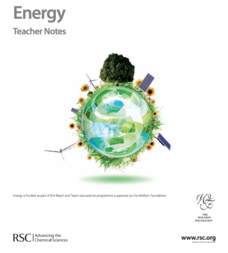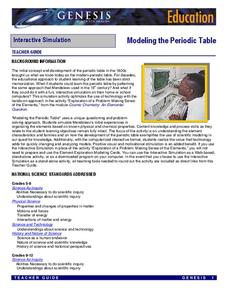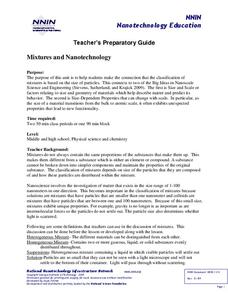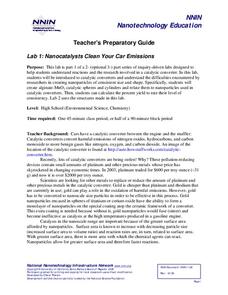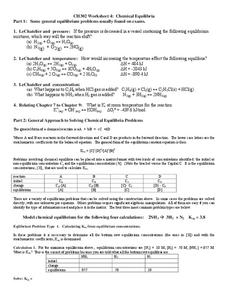Curated OER
Interactive Quiz 2
In this chemistry interactive quiz, students answer 15 multiple choice questions on chemical bonding, enthalpy and Lewis structures.
Curated OER
ToxMystery Lesson Plan 2 : Case Book: Catch That Hazard!!!
Students explore toxic hazards. In this personal health lesson, students discover appropriate uses for household chemicals as they identify potentially harmful products in their homes.
Curated OER
What's the Matter with My Snow?
Students collect snow samples around their school. They explore the concepts of density and phase change as well as the math skills of measurement and statistics. Students explore the water cycle through an interactive, down loadable...
Curated OER
Chemical Equilibrium
In this chemical equilibrium worksheet, students review hydration, dissociation, and colligative properties. Students also review Le Chatelier's principle. This worksheet has 15 short answer questions and 12 problems to solve.
Curated OER
Article - "Designer Catalysts"
In this catalyst worksheet, students define catalyst and enzyme and explain how these work in a chemical reaction. Students calculate molar mass of a compound. This worksheet has 7 short answer questions and 2 problems to solve.
Curated OER
Reaction Reasoning
Third graders experiment with chemical reactions and examine what happens to the atoms when different reactions occur. In this matter lesson students divide into groups and complete a lab experiment.
Curated OER
Salt, To Use or Not To Use
Fifth graders develop a deeper understanding of chemical and physical changes. They explain how salt is made, used, and the affects it has on the body. They explain that salt in moderation is important to our health.
Curated OER
Candle Observations
Students view a demonstration and record and questions and observations that they have. In this candle lesson students discuss their observations and give examples of the changes they saw.
Curated OER
Exothermic and Endothermic Changes
Pupils define and identify endothermic/exothermic reactions. Using a series of experiments, they construct and interpret potential energy diagrams for their reactions.
Curated OER
Chemical Solutions
For this chemical solutions worksheet, Students determine the significance of the critical point in a phase diagram and rank solutions from weakest to strongest solute-solvent interaction. This worksheet has 4 problems to solve.
Cornell University
Atomic Bonding
Explore the connection of surface area to bonding within atoms. Learners complete lab investigations to model changing surface area with different sizes and concentrations of atoms. A flour fireball demonstration follows the labs to...
Royal Society of Chemistry
Energy—Gifted and Talented Chemistry
What has more energy than a room full of pupils after a fire drill? This lesson plan! Explore the changes in energy during different chemical reactions, discover why some reactions feel cold and others feel hot, and tackle the concept of...
NASA
Modeling the Periodic Table
Imagine a race to complete a puzzle where each person has the same 50 pieces, knows they are missing other pieces, and must figure out how everything fits together. The winner gets fame, listed in books for years to come, and a financial...
Space Awareness
Fizzy Balloons - C02 in School
Carbon dioxide is a very important gas; it is present in the air, used in cooking, and supports plant and animal life. Scholars investigate the properties of carbon dioxide with three different activities. They experience a color change,...
San Francisco Public Utilities Commission
Pesky Plastics: The Problem with Plastic
What can happen to the environment if plastic continues to pollute it? Learners read about the implications of plastic on health, water, and nature in a two-page reading passage. After they finish reading, they work on six comprehension...
National Nanotechnology Infrastructure Network
Synthesis and Characterization of CdSe Quantum Dots
Does the size of a sample change the physical properties of that substance? It turns out it can! Young scientists combine physics and chemistry to synthesize CdSe quantum dots and record their color properties. Learners should notice a...
National Nanotechnology Infrastructure Network
Mixtures and Nanotechnology
What does size have to do with it? Learners analyze different mixtures, both homogeneous and heterogeneous, to discover the properties related to the size of their particles. The activity connects these properties to those of...
National Nanotechnology Infrastructure Network
Lab 1: Nanocatalysts Clean Your Car Emissions
What a big job for such a small particle. Young scientists learn about the role of nanoparticles in catalytic converters for cars. They conduct an experiment to create alginate-MnO2 catalytic spheres.
Curated OER
Chemical Equilibria and an Introduction to Water Chemistry
In this equilibrium and water chemistry learning exercise, students solve twenty problems related to acids and bases, equilibrium and water.
Curated OER
Chemical Equilibria
In this equilibria learning exercise, students are given detailed information about LeChatelier's principle and how to solve equilibrium problems. They then calculate concentrations of compounds in solutions.
Curated OER
Types of Chemical Reactions
In this chemical reactions worksheet, students read about the 3 types of chemical equations and how to write balanced ionic equations. Students are given 5 equations to balance, write the type of reaction, write the total ionic equation,...
Curated OER
Climate Change: Is there a Controversy
Students explore climate changes. For this climate changes lesson, students research what causes changes. Students search the Internet, summarize reports they find and create a poster with the information.
Curated OER
Ice Cream Science
Students review properties of matter and discuss how materials change when things are done to them. They observe how materials change as a reaction to temperature by following the procedure to make ice cream and recording the temperature...
American Chemical Society
Changing State: Melting
Dry ice is extremely cold — it is -109.3°F or -78.5°C. Scholars observe and explain the molecular motion associated with melting. Then they design their own experiments to speed up the melting process. Finally, a teacher presents a...













